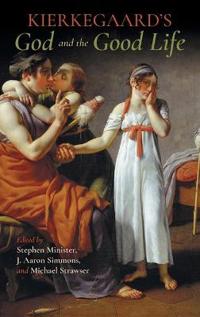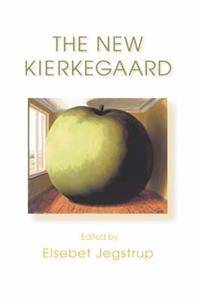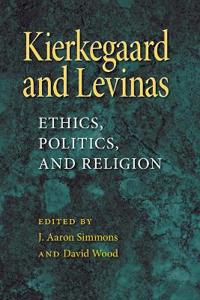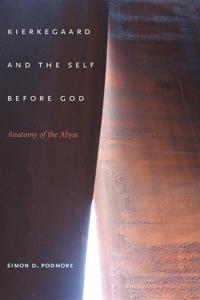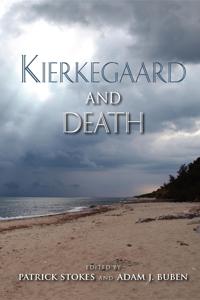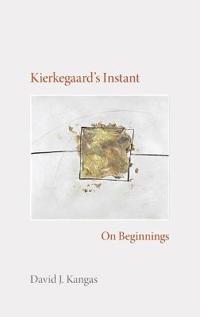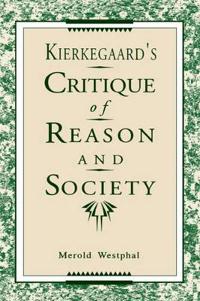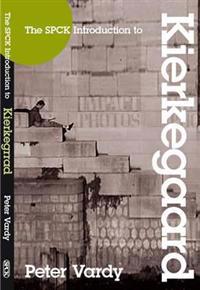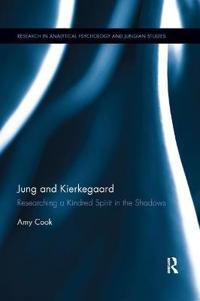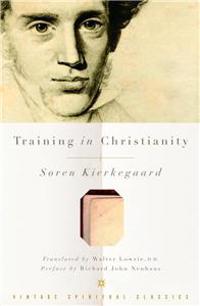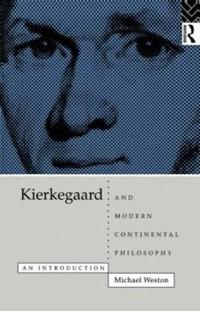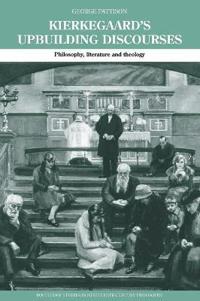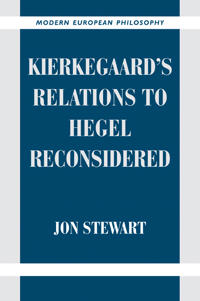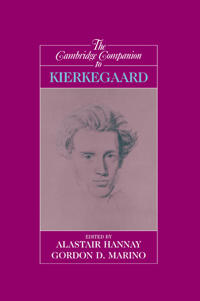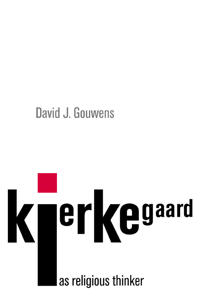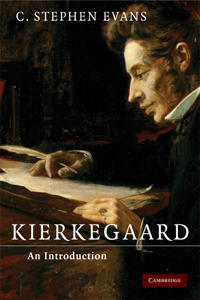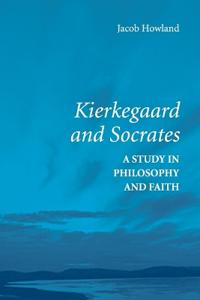Kierkegaard's God and the Good Life
ISBN: 9780253029249 - UTGIVEN: 2017-09Kierkegaard's God and the Good Life focuses on faith and love, two central topics in Kierkegaard's writings, to grapple with complex questions at the intersection of religion and ethics. Here, leading scholars reflect on Kierkegaard's understanding of God, the religious life, and what it means to ex[...]
Kierkegaard's God and the Good Life (häftad)
ISBN: 9780253029362 - UTGIVEN: 2017-09Kierkegaard's God and the Good Life focuses on faith and love, two central topics in Kierkegaard's writings, to grapple with complex questions at the intersection of religion and ethics. Here, leading scholars reflect on Kierkegaard's understanding of God, the religious life, and what it means to ex[...]
The New Kierkegaard (Häftad)
ISBN: 9780253216236 - UTGIVEN: 2004-04Placing Kierkegaard squarely within the currents of contemporary continental philosophy, "The New Kierkegaard" reveals intriguing insights into the philosopher's work and thinking. By reading Kierkegaard deconstructively, the thirteen lively essays in this volume seek a deeper understanding of Kierk[...]
Kierkegaard and Levinas (häftad)
ISBN: 9780253220301 - UTGIVEN: 2008-10Recent discussions in the philosophy of religion, ethics, and personal political philosophy have been deeply marked by the influence of two philosophers who are often thought to be in opposition to each other, Soren Kierkegaard and Emmanuel Levinas. Devoted expressly to the relationship between Levi[...]
Kierkegaard and the Catholic Tradition (Häftad)
ISBN: 9780253222367 - UTGIVEN: 2010-11Although Soren Kierkegaard, considered one of the most passionate Christian writers of the modern age, was a Lutheran, he was deeply dissatisfied with the Lutheran establishment of his day. Some scholars have said that he pushed his faith toward Catholicism. Placing Kierkegaard in sustained dialogue[...]
Kierkegaard and the Self Before God (Häftad)
avSimon D. Podmore
ISBN: 9780253222824 - UTGIVEN: 201105Simon D. Podmore claims that becoming a self before God is both a divine gift and an anxious obligation. Before we can know God, or ourselves, we must come to a moment of recognition. How this comes to be, as well as the terms of such acknowledgment, are worked out in Podmore's powerful new reading [...]
Kierkegaard and Death (Häftad)
avDale Carnegie (Carnagey), Berg J Esenwein
ISBN: 9780253223524 - UTGIVEN: 201112Few philosophers have devoted such sustained, almost obsessive attention to the topic of death as Soren Kierkegaard. Kierkegaard and Death brings together new work on Kierkegaard's multifaceted discussions of death and provides a thorough guide to the development, in various texts and contexts, of K[...]
Kierkegaard's Instant
ISBN: 9780253348593 - UTGIVEN: 2007-05In Kierkegaard's Instant, David J. Kangas reads Kierkegaard to reveal his radical thinking about temporality. For Kierkegaard, the instant of becoming, in which everything changes in the blink of an eye, eludes recollection and anticipation. It constitutes a beginning always already at work. As Kang[...]
The SPCK Introduction to Kierkegaard (Häftad)
avPeter Vardy
ISBN: 9780281059867 - UTGIVEN: 2008-09This is a book about a remarkable man - yet in an important sense it is not about this man at all. Soren Kierkegaard died in Copenhagen, Denmark, at the age of forty-two in 1855. His writings had little influence in his lifetime and after his death, even with the translation of some of his works int[...]
Jung and Kierkegaard (häftad)
ISBN: 9780367204129 - UTGIVEN: 2019-01Jung and Kierkegaard identifies authenticity, suffering and self-deception as the three key themes that connect the work of Carl Jung and Soren Kierkegaard. There is, in the thinking of these pioneering psychologists of the human condition, a fundamental belief in the healing potential of a religiou[...]
Training in Christianity (Häftad)
avSoren Kierkegaard, John F. Thornton
ISBN: 9780375725647 - UTGIVEN: 200412The nineteenth-century Danish philosopher offers a challenging approach to the Christian faith and calls for living out the implications of Christianity in every aspect of life, explaining how to develop one's personal integrity in accordance with the truths of revealed religion and basing his call [...]
How to Read Kierkegaard (Häftad)
avJohn D. Caputo
ISBN: 9780393330786 - UTGIVEN: 2008-07Soren Kierkegaard is one of the prophets of the contemporary age, a man whose acute observations on modern European life might have been written yesterday, whose work anticipated fundamental developments in psychoanalysis, philosophy, theology, and the critique of mass culture by more than a century[...]
Kierkegaard and Modern Continental Philosophy (Häftad)
avMichael Weston
ISBN: 9780415101202 - UTGIVEN: 1994-04In Kierkegaard and Modern European Philosophy: An Introduction Michael Weston argues that, despite being acknowledged as a precursor to Nietzsche and post-Nietzschean thinkers such as Heidegger and Derrida, the radical nature of Kierkegaard's critique of philosophy has been missed. Weston examines [...]
The Routledge Philosophy Guidebook to Kierkegaard and Fear and Trembling (Pocket)
avJohn Lippitt
ISBN: 9780415180474 - UTGIVEN: 2003-06-26Kierkegaard's influence can be observed across the spectrum of twentieth century philosophy and philosophy of religion. This book offers a compelling examination of this most famous work, Fear and Trembling.[...]
Kierkegaard's Upbuilding Discourses (Häftad)
avGeorge Pattison
ISBN: 9780415868310 - UTGIVEN: 2013-09George Pattison provides a bold and innovative reassessment of Kierkegaard's neglected Eighteen Upbuilding Discourses and reading of his work as a whole. The first full length assessment of the discourses in English, this volume will be essential reading for philosophers and theologians, and anyone [...]
Kierkegaard's Relations to Hegel Reconsidered
ISBN: 9780521039512 - UTGIVEN: 2007-08Jon Stewart's study is a major re-evaluation of the complex relations between the philosophies of Kierkegaard and Hegel. The standard view on the subject is that Kierkegaard defined himself as explicitly anti-Hegelian, indeed that he viewed Hegel's philosophy with disdain. Jon Stewart shows convinci[...]
The Cambridge Companion to Kierkegaard (Inbunden)
ISBN: 9780521471510 - UTGIVEN: 1997-10Each volume of this series of Companions to major philosophers contains specially-commissioned essays by an international team of scholars, together with a substantial bibliography, and will serve as a reference work for students and non-specialists. The contributors to this Companion probe the full[...]
The Cambridge Companion to Kierkegaard (Pocket)
avAlastair Hannay, Gordon Daniel Marino, Alastair Hannay
ISBN: 9780521477192 - UTGIVEN: 199711Each volume of this series of Companions to major philosophers contains specially-commissioned essays by an international team of scholars, together with a substantial bibliography, and will serve as a reference work for students and non-specialists. The contributors to this Companion probe the full[...]
Kierkegaard
ISBN: 9780521531818 - UTGIVEN: 2003-05Written by one of the world?s preeminent authorities on Kierkegaard, this biography is the first to reveal the delicate imbrication of Kierkegaard?s life and thought. To grasp the importance and influence of Kierkegaard?s thought far beyond his native Denmark, it is necessary to trace the many facto[...]
Kierkegaard as Religious Thinker (Häftad)
avDavid J. Gouwens
ISBN: 9780521555517 - UTGIVEN: 199602Using Kierkegaardâs later religious writings as well as his earlier philosophical works, David Gouwens explores this philosopherâs religious and theological thought, focusing on human nature, Christ, and Christian discipleship. He helps the reader approach Kierkegaard as someone who both a[...]
Kierkegaard (Pocket)
avC. Stephen Evans
ISBN: 9780521700412 - UTGIVEN: 200904C. Stephen Evans provides a clear, readable introduction to Soren Kierkegaard (1813-55) as a philosopher and thinker. His 2009 book is organised around Kierkegaard's concept of the three 'stages' or 'spheres' of human existence, which provide both a developmental account of the human self and an und[...]
Kierkegaard and Socrates (Häftad)
avJacob Howland
ISBN: 9780521730365 - UTGIVEN: 2008-04This volume is a study of the relationship between philosophy and faith in Soren Kierkegaard's Philosophical Fragments. It is also the first book to examine the role of Socrates in this body of writings, illuminating the significance of Socrates for Kierkegaard's thought. Jacob Howland argues that i[...]

